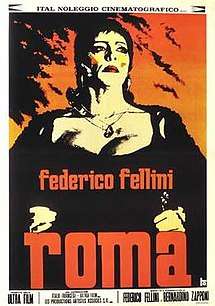Roma (1972 film)
| Roma | |
|---|---|
 Original film poster | |
| Directed by | Federico Fellini |
| Produced by | Turi Vasile |
| Screenplay by |
Federico Fellini Bernardino Zapponi |
| Story by |
Federico Fellini Bernardino Zapponi |
| Starring | Peter Gonzales |
| Music by |
Nino Rota Carlo Savina |
| Cinematography | Giuseppe Rotunno |
| Edited by | Ruggero Mastroianni |
Production company |
Les Productions Artistes Associés Ultra Film |
| Distributed by |
Ital-Noleggio Cinematografico (Italy) United Artists |
Release date |
|
Running time |
128 minutes 119 minutes (Cut edit) |
| Country |
Italy France |
| Language |
Italian German English French Latin Spanish |
| Box office | ITL869,900,000 |
Roma, also known as Fellini's Roma, is a 1972 semi-autobiographical, poetic comedy-drama film depicting director Federico Fellini's move from his native Rimini to Rome as a youth. It is a homage to the city, shown in a series of loosely connected episodes set during both Rome's past and present. The plot is minimal, and the only "character" to develop significantly is Rome herself. Peter Gonzales plays the young Fellini, and the film features mainly unknowns in the cast.
Plot
Federico Fellini recounts his youth in Rome. The film opens up with a long traffic jam to the city. Once there, scenes are shown depicting Rome in the 1930s, with people visiting a third-class theater and a brothel. The most famous scene depicts an elderly solitary noblewoman holding an extravagant liturgical fashion show for a Cardinal and other guests with priests and nuns parading in all kinds of bizarre costumes. [1] The film eventually concludes with a group of young motorcyclists riding into the city and a melancholic shot of actress Anna Magnani, whom the film crew met in the street during shooting and who would die some months afterwards.
Alberto Sordi's performance
During editing, a scene with Alberto Sordi was cut because it was considered too immoral and cruel. Sordi played a rich man sitting at a bar watching some poor kids playing ball. A poor man, blind, sick and lame, comes to cross the street, preventing the rich man from viewing the scene. Alberto Sordi, annoyed, begins shouting insults at the blind man: "Get out of the way, you ugly old man! Get out!".
Cast
- Peter Gonzales as Federico Fellini, age 18
- Fiona Florence as Dolores - young prostitute
- Pia De Doses as Princess Domitilla
- Renato Giovannoli as Cardinal Ottaviani
- Uncredited
- Dennis Christopher as The Hippie
- Anna Magnani (her final film role) as herself
- Marcello Mastroianni as himself
- Feodor Chaliapin, Jr. as actor playing Julius Caesar
- Alberto Sordi as himself
- Gore Vidal as himself
- John Francis Lane as himself
- Elliott Murphy as extra
- Federico Fellini as himself
- Cassandra Peterson
Historical contrasts and modern alienation
Fellini repeatedly contrasts Roman life during wartime Fascist Italy with life in the early 1970s. The wartime scenes emphasize the congregation of neighbors in Rome's public places, such as street restaurants, a variety show, and a bomb shelter. With the exception of hippies and a conversational scene with Fellini bemoaning the loss of Roman life with radical students, the analogous congregations of the 1970s are between automobiles and motorcycles. Fellini makes a comparison between the parade of prostitutes at wartime brothels and a fantasy runway fashion show featuring clerical garb and a papal audience.
Narrative devices
The plot (such as it is) centers on two journeys to Rome by the director. The first is as a young man in the late 1930s and early 1940s. The second is as the director of a film crew creating a movie about Rome. The film alternates between these two narratives.
Release
The film was screened at the 1972 Cannes Film Festival but wasn't entered into the main competition.[2] The film was also selected as the Italian entry for the Best Foreign Language Film at the 45th Academy Awards but was not accepted as a nominee.[3] The film has been made available in the Criterion Collection.[1]
See also
References
- 1 2 https://www.criterion.com/films/28039-roma
- ↑ "Festival de Cannes: Roma". festival-cannes.com. Retrieved 2009-04-17.
- ↑ Margaret Herrick Library, Academy of Motion Picture Arts and Sciences
External links
- Ricordando Anna Magnani, the website dedicated to the great actress Anna Magnani.
- Roma on IMDb
- Roma at AllMovie
- Roma at Rotten Tomatoes